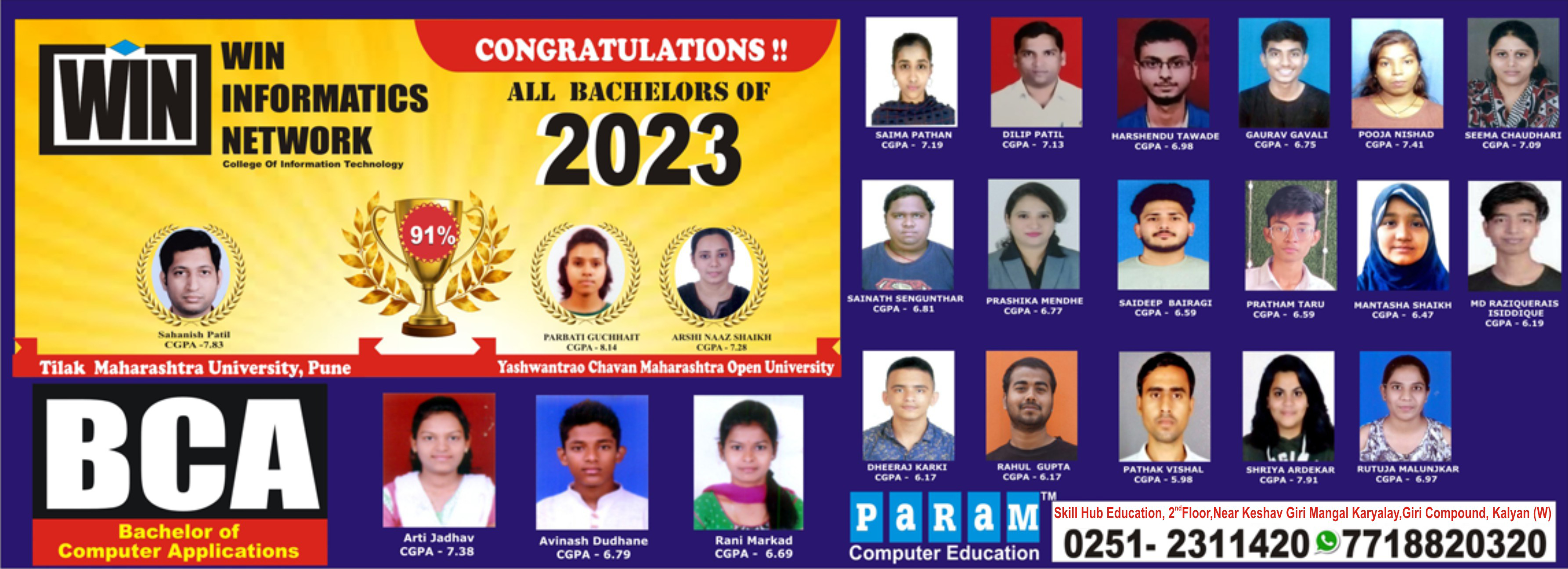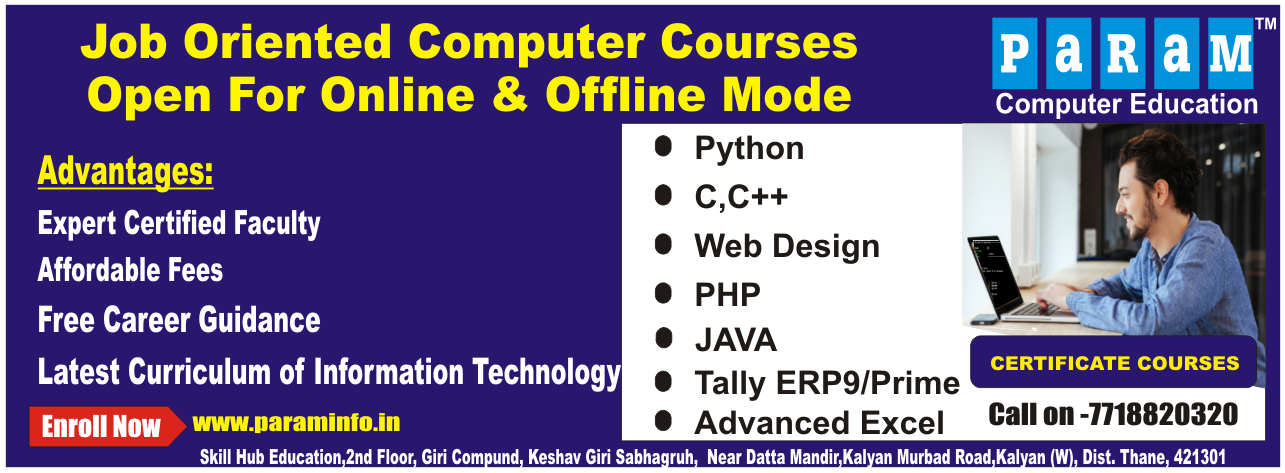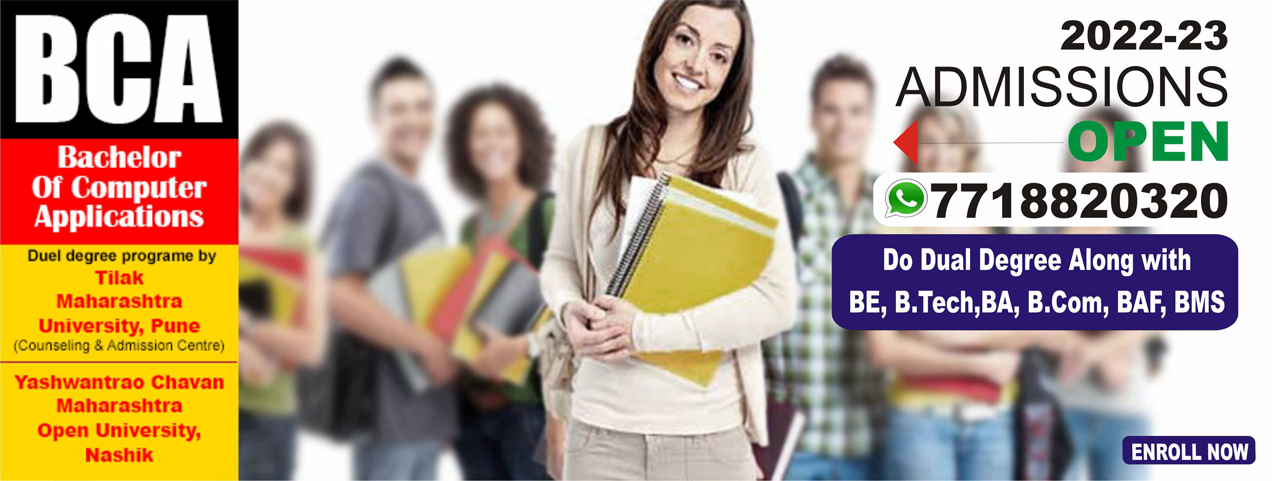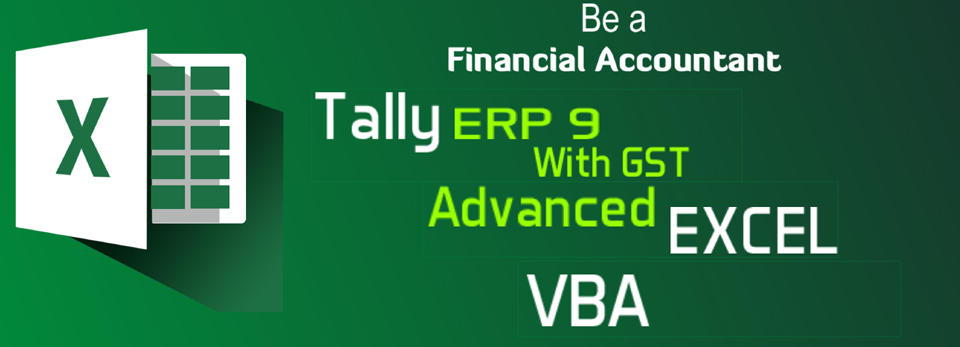Win Informatics Network is a leading BCA college in Kalyan West, offering the Bachelor of Computer Applications (BCA) degree affiliated with Yashwantrao Chavan Maharashtra Open University (YCMOU). Our college serves students near by area from Kalyan,Vithalwadi,Ambernath,Badlapur, Dombivli,Kalwa,Mumbra and Thane District who are looking for a career-oriented computer applications degree.
(BCA): Bachelor of Computer Application.
Bachelorof computer application (BCA) is a new age degree Programme in the field of computer application. With the rapid growth of IT industry in India, the demand of computer professional is increasing day by day. This increasing growth of IT industry has created a lot of opportunities for the computer graduates.
Bachelor of computer application (BCA) is one of the popular degree programme among the students who want to make their career in the IT field. The duration of the course is 3 years and comprises of the subjects like database, networking, data structure, core programming languages like ‘C’ and ‘java’, .net, Asp.net . This course provides a lot of opportunities to the students who are interested in computer field and wants to work in the IT sector as programmer or software developer.
Duration : 3 Years (Six Semesters)
Eligibility : Obtaining Qualifying marks in Common
Entrance Test conducted by YCMOU
12th standard of HSC Board of Maharashtra (Any stream without Maths), or its equivalent [including MCVC (Minimum Competency Vocational Courses)]
OR
Three years Diploma of Board of Technical Examination or equivalent (other than computer and Information technology)
OR
Two years ITI Programme of any trade after 10th standard-passed
OR
Two years course of Maharashtra State Board of Vocational Education after 10th.
- Syllabus
- Exam
- Admission
- FAQ
|
||||||||||||||||||||||||||||||||||||||||||||||||||||||||||||||||||||||||||||||||||||||||||||||||||||||||||||||||||||||||||||||||||||||||||||||||||||||||||||||||||||||||||||||||||||||||||||||||||||||||||||||||||||||||||||||||||||||||||||||||||||||||||||||||||||||||||||||||||||||||||||||||||||||||||||||||||||||||||||||||||||||||||||||||||||||||||||||||||||||||
| Fee Structure : | ||||||||||||||||||||||||||||||||||||||||||||||||||||||||||||||||||||||||||||||||||||||||||||||||||||||||||||||||||||||||||||||||||||||||||||||||||||||||||||||||||||||||||||||||||||||||||||||||||||||||||||||||||||||||||||||||||||||||||||||||||||||||||||||||||||||||||||||||||||||||||||||||||||||||||||||||||||||||||||||||||||||||||||||||||||||||||||||||||||||||
|
||||||||||||||||||||||||||||||||||||||||||||||||||||||||||||||||||||||||||||||||||||||||||||||||||||||||||||||||||||||||||||||||||||||||||||||||||||||||||||||||||||||||||||||||||||||||||||||||||||||||||||||||||||||||||||||||||||||||||||||||||||||||||||||||||||||||||||||||||||||||||||||||||||||||||||||||||||||||||||||||||||||||||||||||||||||||||||||||||||||||
| ^Up | ||||||||||||||||||||||||||||||||||||||||||||||||||||||||||||||||||||||||||||||||||||||||||||||||||||||||||||||||||||||||||||||||||||||||||||||||||||||||||||||||||||||||||||||||||||||||||||||||||||||||||||||||||||||||||||||||||||||||||||||||||||||||||||||||||||||||||||||||||||||||||||||||||||||||||||||||||||||||||||||||||||||||||||||||||||||||||||||||||||||||
As per NEP2020, the evaluation pattern of the BCA Programme consists of the following components.
| Components | Number of Credits | University Assessment | Continuous Assessment | Total Marks | Passing Marks |
| Theory papers |
4 | 70 | 30 | 100 | Secure minimum 40% marks in University Assessment as well as Continuous Assessment separately. |
| 2 | 35 | 15 | 50 | ||
| Field Project/OJT | 4 | 50 | 50 | 100 | |
| Research Projects | 4 | 50 | 50 | 100 | |
| 6 | 75 | 75 | 150 |
- Learner will have to obtain minimum 40% marks to pass in each course in university assessment and continuous assessment separately.
- The marks obtained by the learner in Continuous Assessment will be shown separately in the Mark Sheet.
- University will upload the home assignment questions on university website http://ycmou.digitaluniversity.ac learners should download the home assignment questions from the university website.
- The learners must submit neatly hand-written home assignments in softcopy format through the Home Assignment submission portal, as per the schedule declared by the University.
- These assignments shall be evaluated by the Counselors of the concerned courses.
- Learners should follow the university guidelines regularly and communicate with their respective Learner Support Centers for submission of their assignments within time.
- The learners who fail to submit these assignments within the stipulated time would not to be allowed to re-submit the same after the commencement of the Semester end examination and he/she would be awarded ‘zero’ marks/ABSENT, and the same would be displayed in his/her mark sheet.
- Assignments submission for each course must be completed within the stipulated dates in the same semester of an academic year as communicated by the University. The university will not permit resubmission/late submission of assignment under any circumstances.
- If learner fail to complete practical work then she/he will be allowed to do it with next batch.
- For practical papers of credits 2 and 4 two hours practical is permitted. One batch can contain 18 to 20 learners.
- “Absolute Grading”: the marks are converted to grades based on pre-determined class intervals.
- “Letter Grade”: It is an index of the performance of students in a said programme. Grades are denoted by letters O, A+, A, B+, B, C, P and F.
- “Grade Point”: It is a numerical weight allotted to each letter grade on a 10-point scale. Grade Point shall be “0 (Zero)” for Letter Grade “Ab” and “F”. The marks scored by the examinee shall be converted into grade points by dividing the marks scored in the aggregate and dividing the resulting number by maximum marks, multiplying the result by ten, retaining the integer part (ignore the fractional part). Thus, if a person has secured 56 marks out of 100 marks in aggregate for a course, we get (56/100) x 10 which is 5.6. Ignoring the fraction, we get 5 as the grade point.
- The UGC recommends a 10-point grading system with the following letter grades and points as given below:
- “Credit Point”: It is the product of grade point and number of credits for a course.
- “Semester Grade Point Average (SGPA)”: It is a measure of performance of work done in a semester. It is the ratio of sum of the product of the number of credits with the grade points scored by a student in all courses taken by a student and the sum of number of credits of all the courses undergone by a student:
- “Cumulative Grade Point Average (CGPA)”:It is a measure of overall cumulative performance of a student over all semesters. The CGPA is the ratio of total credit points secured by a student in various courses in all semesters and the sum of the total credits of all courses in all the semesters. The CGPA is also calculated in the same manner taking into account all the courses undergone by a student over all the semesters of a programme.

- Where, Siis the SGPA of the i th semester & Ci is the total number of credits in that semester. It shall be expressed up to two decimal places.
- “Transcript or Grade Card or Certificate”:Based on the grades earned, a grade certificate shall be issued to all the registered learners after every semester. The grade certificate will display the course details (code, title, number of credits, grade secured) along with SGPA of that semester and CGPA earned till that semester.
- Apply for Entrance Test (CET) Conducted by YCMOU.
- Admissions are given on first cum first basis with minimum 50% marks and Qualify Common Entrance Test (CET) Conducted by YCMOU.
- Students are required to purchase, prospectus along with the application form, from the study center by paying Rs. 100/- .
- Submit the duly filled form along with attested ONE xerox copies of SSC and HSC Board exam Mark sheet,LC and Adharcard, Pan Card along with original for verification. Four passport size photos are required.
- Pay the fees by ONLINE MODE ONLY.
- Distance education promotes the opportunity to meet the needs of students unable to attend on-campus classes.
- One of the biggest distance learning benefit is the issue of flexibility and time. A student is not confined to classroom for a certain number of hours on a given day. Online courses provide flexibility when it comes to the completion of lessons.
- Increased access to learning
- Promotes life long learning
- Increased compensation and promotion potential
- Another benefit of distance learning to students is the ability to do interactive teamwork between groups. Students have the opportunity to correspond with others from different backgrounds and to hear from a variety of speakers from around the world.
- Access to experts and tremendous volume of online databases is also a distance learning benefit. Instead of searching for hours through card catalogs and library stacks, you can utilize an online search engine to find countless experts' articles and research databases within seconds.
- Instructor communication is an additional distance learning benefit. With the evolution of e-mail and internet chat rooms, instructor-student contact can be maintained and strengthened. This fosters a better educational experience for the distance learning student.
- Ever had to make a special trip to campus to drop off homework assignment? At two o’clock in the morning? The use of email can allow you to send your homework assignment at any time of day to your professor - safe and convenient. What a benefit for distance learning!
- Have to take a test? Allows you to take an exam without the need for attending a traditional classroom miles away.
- Financial benefits of distance learning exist as well. Without the need to leave your home for spending a semester or a year in a distant city, you can substantially save on transportation, housing, and food costs. It goes without saying that you can keep your full or part time job at the same time you pursue a distance learning course.
- Social benefits of distance learning? Without having to leave your community, you maintain your personal, cultural, and social lifestyle. Your circle of comfort is maintained, reducing additional stress.
(A) Internal Assessment (Continuous Assessment i.e. Home Assignment):
| For 30 marks | For 15 marks |
| Home Assignment 1: Total: 20 Marks | Home Assignment 1: Total: 15 Marks |
| One Long answer questions (10 Marks) | One Long answer questions) (10 Marks) |
| Two short answer questions (10 Marks) | One short answer questions (5 Marks) |
| Home Assignment 2: Total: 10 Marks | |
| 10 objective type questions each of 1 mark |
B) End Examination (EE)–70 Marks.
The End Examination will be of 70 marks for 4 credit courses and of 35 marks for 2 credit courses. The university will conduct end examination as per the schedule declared in advance. The learner will have to obtain minimum 40% marks to pass in each component.
End Examination Question paper pattern
| For 70 marks pattern | For 30 marks pattern |
| Q1. Long Answer (Any one out of two questions) 10 Marks | Q1. Long Answer (Any one out of two questions) 10 Marks |
| Q2. Long Answer (Any one out of two questions) 10 Marks | Q2. Short answer questions (Any two out of three questions) 10 Marks |
| Q3. Long Answer (Any one out of two questions) 10 Marks | Q3. Very Short answer questions (Any five out of six questions) 10 Marks |
| Q4. Short answer questions (Any five out of Six questions) 25 Marks | |
| Q5. Very Short answer questions (Any five out of six questions) 15 Marks |
Practical work Evaluation
| CA | EE | Total | ||||
| Credits | Min Marks | Max Marks | Min Marks | Max Marks | Min Marks | Max Marks |
| 2 | 10 | 25 | 10 | 25 | 20 | 50 |
| 4 | 20 | 50 | 20 | 50 | 40 | 100 |
| 6 | 30 | 75 | 30 | 75 | 60 | 150 |
-
For practical paper CA is of 50 marks and EE is of 50 marks. For practical CA a learner need to prepare workbook/Journal and need to attempt internal Viva -Voce Examination at their respective LSC.
Detailed evaluation structure of OJT, Field project, Research Project: will have CA and EE weightage of 50:50.
| CA | EE | Total | ||||
| Credits | Min Marks | Max Marks | Min Marks | Max Marks | Min Marks | Max Marks |
| 2 | 10 | 25 | 10 | 25 | 20 | 50 |
| 4 | 20 | 50 | 20 | 50 | 40 | 100 |
| 6 | 30 | 75 | 30 | 75 | 60 | 150 |
Detailed evaluation structure of Field Project
| Module | Unit | % of Distribution of Marks | CA |
| 1 | Basic structure of society, key definition of problem area, analysis of preliminary data | 30 | 15 |
| 2 | Classroom-work-correspondence, formats, interactions and liaising | 10 | 05 |
| 3 | Field work and data gathering | 30 | 15 |
| 4 | Analysis and reporting | 20 | 10 |
| 5 | Feed back to community | 10 | 05 |
| Total | 100 | 50 |
On Job Training evaluation structure:
| Sr. No. | Component | % of Distribution of Marks |
| 1 | Behavior, interest in assigned work, willingness to learn | 10 |
| 2 | Accept responsibility, cooperate with coworkers and supervisors, demonstrate organizational skills | 10 |
| 3 | Uses time, knowledge and expertise effectively, Analyzes problems effectively. | 10 |
| 4 | Demonstrates creativity, originality, any innovative contribution, professional ethics and accountability | 10 |
| 5 | Writes effectively, produces high quality work, skill proficiency | 10 |
| Total | 50 |
Learners Evaluation with Grade system:
| Marks Obtained out of 100 | Grade Point | Semester GPA / Programme CGPA/ Semester/ Programme | % of Marks | Alpha-Sign/ Letter Grade Result |
| 90 - 100 | 10 | 9.00 – 10. 00 | 90.0 - 100 | O (Outstanding) |
| 80 – 89.99 | 9 | 8.00 - < 9.00 | 80.0 - < 90.0 | A+ (Excellent) |
| 70 – 79.99 | 8 | 7.00 - < 8.00 | 70.0 - < 80.0 | A (Very Good) |
| 60 – 69.99 | 7 | 6.00 - < 7.00 | 60.0 - < 70.0 | B+ (Good) |
| 55 – 59.99 | 6 | 5.50 - < 6.00 | 55.0 - < 60.0 | B(Above Average) |
| 50 – 54.99 | 5 | 5.00 - < 5.50 | 50.0 - < 55.0 | C(Average) |
| 40 – 49.99 | 4 | 4.00 - < 5.00 | 40.0 - < 50.0 | P(Pass) |
| 0 – 39.99 | 0 | Below 4.00 | Below 40 | F (Fail) |

It shall be expressed up to two decimal places.
A Learner must successfully complete first year, second year including project/ OJT/Field Project component in order to qualify for the award of the BCA degree.
Admission Procedure For 'B.C.A.' From Yashwantrao Chavan Maharashtra University, Nashik.
FAQ
| Quick Ref. : Where is YCMOU | How do I register | Where will I get counseling | What is distance learning | Books & Study material | My Exams schedule | Job guarantee | |
Q |
What is Open Learning? |
A |
Open learning refers to ‘openness’ in education. You can take the education that you want, at your pace and wherever it is needed. You are not bound to attend regular college. There is no upper age limit for a student. There is flexibility in course combinations. |
Q |
Does Distance Education have the same status as conventional education? |
A |
Yes, Distance Education is the accepted mode adopted by a number of Universities the world over. Almost all these universities use the conventional mode too. Considering that many institutions offer both the modes simultaneously, they are comparable. |
Q |
Is the YCMOU a recognised university? |
A |
Yes! (YCMOU) was set up in July 1989 by Act XX(1989) of the Maharashtra State Legistature. The YCMOU has headquarters at Nashik and provides support to its learners through study centers, which are spread all over the State of Maharashtra. |
Q |
Is the YCMOU student eligible for UPSC examinations? |
A |
Yes,. Please refer The Government GR on 'About University' link |
Q |
Are the YCMOU degrees, diplomas and certificates recognised for Government Jobs? |
A |
Yes, Please refer The Government GR on 'About University' link |
Q |
Where is the YCMOU located? < |
A |
The university Head Quarters is located at Nashik, Maharashtra, INDIA. The address is - Yashwantrao Chavan Maharashtra Open University, Dnyangangotri, Near Gangapur Dam, Nashik - 422 222 |
Q |
Do I need to go to Nashik for studying? |
A |
No! The YCMOU has established several Study Centres all over the India. Each academic programme is implemented at specified Study Centres. You may select the Study Centre most convenient to you and after registering at such a Study Centre, attend the contact/ sessions there. |
Q |
Does the University provide study material? |
A |
Yes, YCMOU provides study material to the students for most of its programmes. The cost of this is included in the Programme Fees |
Q |
What is included in the study material? |
A |
Self-instructional study-texts, Workbooks and CDs (wherever applicable), etc. |
Q |
From where can I receive the study material? |
A |
From the Study Centres. The Study Centre distributes the study material after confirmation of the student’s admission. |
Q |
How do I register myself with the YCMOU ? < |
A |
The university has a separate Registration Section to handle registration-related issues. Once you decide about the programme of study, you will need to purchase the Prospectus for the programme, collect all the relevant information about the period of registration, the applicable fees, etc. Contact the Study Centre Coordinator or the Principal for this. |
Q |
What is the registration procedure? |
A |
Collect the prospectus with form from the Study Centre. Fill up the form. Attach the necessary documents. Attach the proper Demand Draft of fees. Submit it to the Study Centre. |
Q |
What is counselling? |
A |
Counselling is the academic support given at the recognized Study Centre. It could be in the form of lectures delivered by an expert, group discussions, presentations, quizzes, etc. |
Q |
Where will I get counseling? < |
A |
At the study centre. Once your admission is confirmed, you are eligible for attending counselling sessions at the study centre. |
Q |
What documents are required for admission |
A |
Only attested zerox copies of the certificate and marksheets of Board exams that You have Passed. And originals only for verification. |
Q |
Can I continue my other graduation/ post graduation programs with other universities. |
A |
Yes open universities do not require any migration or original certificates for submission So you are eligible to continue Your other programs simultaneously. DUAL DEGREE IS PERMITTED. |
Q |
How exams will be conducted. |
A |
University has decided to conduct the descriptive end examination pattern from academic year 2016-17. |
Q |
What is distance learning and what is scope of it. < |
A |
Distance education is a field of learning which focuses on a convenient delivery of education to those who cannot attend regular classroom courses. Students of distance education access their courses through printed study material as well as online learning soft wares. This is an advanced branch of learning through which students from any corner of the world can pursue their desired degrees of course with help of today’s technology. |
| Scope and Benefits: There are numerous distance learning benefits which you ought to consider when electing to take an online distance learning course. |
|
| Distance education is an education that aims to deliver education to students who are not physically present and the main advantage of distance education is the students rather than attending courses individually can communicate through internet with the teachers at their own time and can exchange the material over the net, DLP India would be a great help for the students who are looking for distance learning courses in different field starting from Undergraduate to Post Graduate in Management and Technology. |
|
Q |
Do I need to refer other books in addition to material supplied by university. < |
A |
The course material delivered to You by university will cover the courses topics in sufficient detail. How ever we also suggest certain reference books that you can read in order to get in depth knowledge on topics covered. |
Q |
Is entire Study material is available at a time |
A |
No It is delivered as per semester subjects. |
Q |
If there is need of Computer at home for practice. |
A |
Generally we provide sufficient practice (unlimited ) hours for students. A PC at home may be for additional practice But not compulsion. |
Q |
Do I need to pass any entrance Test for taking admission for any of the program. |
A |
No Absolutely Not. You need to fulfill the eligibility criteria that’s all. Admissions are given First cum First Serve Basis. |
Q |
When will be My Exams scheduled. < |
A |
For YCMOU Exams will be In the Month Of December and June. |
Q |
How can I pay my fees in Cash or cheque. |
A |
You can pay your fees in cash, cheque or DD. |
Q |
Is there Education Loan available for these programs. |
A |
Yes. You can enquire that with your Bank also. |
Q |
Can I complete these programs while taking a job. |
A |
Yes. Definitely weekend batches are available for selected programs (sat-Sun). |
Q |
Do you provide job guarantee after these programs. < |
A |
Yes. (With conditions.) Please see the conditions on 'Why at us' link. |
Copyright © 2014 - All Rights Reserved - PARAM
Best Colllege in kalyan | Colllege near me | Best BCA Collleges in kalyan | BCA near me







 1
1 2
2 3
3 4
4 5
5 6
6